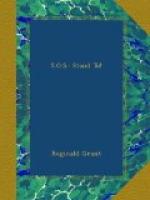The stage was set and the play started at 5:30 in the afternoon. Our orders were to blow holes in the parapet wire which ran in a zigzag direction every way out in front, for the purpose of enabling the infantry to get through when they got over. Our ammunition was of the best; we now took no chance on any defective goods. We had 20 rounds of shell for each gun. When we got the order—“Fire!” gaps were torn in the wire by my gun, and the other gun had blown away some small ridges. We were going strong when a shell—the very first one—took our other gun, blowing it and the crew into nothingness. We went on firing until we had exploded 18 shells and had made several gaps in the wire, when, without a moment’s warning, our trench mine exploded. The trenches were packed with troops ready for the word. A mountain of debris was shot in the air and back over us, burying a number of soldiers in the trench, where they died miserably from suffocation. The concussion was so powerful that it blew the shield of my gun off downwards, cleaving Corporal King’s skull in twain and blowing Gunner MacDonald, who was sitting on the handspike of the gun, 20 feet away. When we found him next day, every bone in his body was broken. I was sitting on the gun alongside of Corporal King at the time of his death, and how I escaped is more than I can tell. Again I couldn’t help speculating that my life must have been spared for some good purpose; I sincerely hope so.
It was impossible to do any further firing, as the muzzle of the gun was choked completely with the dirt that had been shot backward by the explosion of our own mine. Our misfortune, however, did not prevent or deter for a moment the intended movement. Unable to do anything further as a gunner, I hopped into the charge with the 48th Highlanders of Toronto, who had just started with one of their old-time yells to go out and over. When we reached the German front lines,—or what was left of them, for the explosion had blown from them all semblance of a trench,—it was jammed full of German troops—dead. On we went, inclining to the right and reaching an orchard in which was a nest of them concealed in the trees. Those on mother earth were speedily driven to hell or made good their escape, and we then attended to the case of the squirrels in the branches. This was somewhat difficult, as the night was excessively dark, but our snipers, circling everywhere underneath them, finally got them; not a single baby-killer escaped; it was a case of getting limburgers in an apple tree.
No sooner had we cleaned up the job than the Fritzies returned en masse formation, compelling us to beat a discretionary retreat to their front-line trenches, where we held and are still holding, and then some. Here we remained until the middle of the following month.
Some minor engagements took up my duties after Givenchy, until about September 1, when my battery was instructed to proceed to Ploegsteert.




